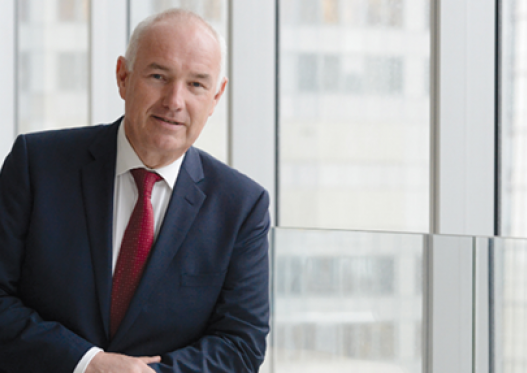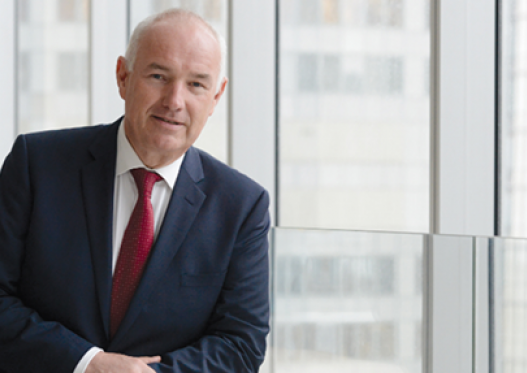Chartered Banker Institute - which partnered with FINSIA to bring professional qualifications to Australia - is seeing a big uptake in bankers studying for qualifications outside its United Kingdom base despite COVID-19.
The world’s oldest banking institute expects more courses to be taken outside the UK for the first time, with 15 - 20,000 exams being sat in 2021. That’s not including those run by FINSIA.
The industry’s move towards global professional standards was just one of the takeouts from a wide-ranging interview with CBI chief executive Simon Thompson who also talked about lessons from the UK, PPI, COVID and fintechs.
“One thing that's really surprised me this year is that the take up of Chartered Banker around the world has accelerated, despite the fact that obviously we're only just allowed to leave the UK,” he said.
“The international influence and the collaboration building partnerships - not only with FINSIA - but in places like the Bahamas, India, Ireland, Malaysia and elsewhere has been a real continued focus for us.
“We're now proud to have students in 108 countries. That’s grown from 87 countries 12 months ago.
“Next year we anticipate delivering 15,000 or more exams internationally across an increasing range of countries, more if we include our partnership with FINSIA.
“That will be the first time we've run more exams internationally than in the UK, which gives a sense of where we're moving. So I'm really pleased and proud of what we're doing internationally.
“But as with FINSIA, it's all about the strength of the partnerships we have with the banking institutes around the world.”
Mr Thompson was speaking shortly after NAB announced it was putting all 34,000 of its staff through FINSIA courses as part of its strategy to develop better bankers.
“We're certainly very proud to be working with FINSIA supporting consumer and the financial service community in Australia more widely,” he said.
“The development of the Professional Banking Fundamentals qualification, followed by Certified Professional Banker and Chartered Banker all reflect a move towards professionalisation in financial services.
“I think it's an important part of trying to develop global standards for bankers and for banking education that will help build trust in banks and bankers right across the world, as well as build higher standards of capability and competence - which are inextricably linked of course.
“In terms of Australia specifically, the news about NAB has been absolutely, absolutely fantastic. It's a huge feather in the cap for everyone that worked so hard for this over three years.
“There was very little professional banking education in Australia three years ago, but working with FINSIA we have very quickly filled the gap.”
FINSIA’s professionalisation strategy pre dated the Royal Commission here. Similarities to CBI’s drive for professionalisation and the global financial crisis are there to see. But Mr Thompson acknowledges other scandals that best UK financial services bought attention to the industry.
“I wouldn't necessarily see Payment Protection Insurance as a turning point,” he said of the scandal that is currently costing financial services $110billion.
“I think it probably was more of an acceleration.
“It did give us a much more prominent public platform for what we've been saying for many years - that banking should be treated as a profession rather than simply as an industry.
"When times are good, banking seems very easy and it did seem very easy for a couple of decades, but when things turn, banking gets very difficult very quickly.
“The GFC made it clear that there is a huge broad public interest in ensuring that banking can play a key role as the engine of the economy, especially given the fact that tax-payers had to support some banks when things went wrong.
“I think what PPI brought into it was the understanding that there was an asymmetry of information between banks and clients and that needed to be based on solid ethical foundations.”
There had already been growing interest in the qualifications before PPI - as well as interest from regulators and industry.
“What's interesting if we look at it now is although PPI still rumbles on a little bit in the UK, there's almost a generation of people in banking now who don't remember the GFC, who barely remember PPI because we're talking about things that are 12 years, a decade ago.
“That's one of the most important goals all professional bodies can play - making sure that the lessons we learned from those episodes are not lost on new generations.
“Part of the teaching technical banking and financial services skills through our qualifications is also teaching and trying to inculcate and embed an ethical and professional mindset.
“Ongoing membership is also an important part of what we do - equally as important as people gaining qualifications.”
When faced with a reluctance to embrace professionalism Thompson says he will always want to "make the ethical and moral case", but says the "business case for institutions" proves its worth.
“Customers expect 90% of bankers to have passed their banking exam.
“Two-thirds of business customers want to deal with Chartered Bankers and just not with somebody qualified.
“We hear time and time again from banks that our aim is to give customers what they want. Well customers have spoken with one very powerful voice very consistently for the past decade and that is, they want professionals.
“For a bank may turn now and say, 'Well, we don't believe in this' means you're not truly listening to your customers.
“It's surely one of the best investments in terms of its potential return on investment that an institution can make. If you don't believe in the moral case or the customer case just look at the financial case and that's very easy to make.
“In the UK, the PPI bill alone could cost the retail buying close to 60 billion pounds ($110bn).
“The cost of having everybody in an institution take a professional qualification and be a member of a professional body, depends on how many people there are, but you're talking about a few millions of pounds.
“So even if you're only able to reduce the conduct bill from PPI alone, by 10%, that's about six billion pounds it costs the industry ($11bn).
“That's an enormous return on investment.
“I entirely accept that professionalism isn't only about taking a course and being a member of a professional body and that internal training and development plays a valuable role.
“But equally if a senior banker says to me - and I haven't heard this for a few years now, but I did hear it said - ‘We don't need a professional body. We do professionalism ourselves’.
“In that case, would you be happy to be operated on by a surgeon who isn't a member of the Royal college of surgeons, but has taken a few eLearning courses and is pretty sure he knows what he's doing, but doesn't have any accreditation of that.
“When people challenge and say, ‘Oh, well, but that's very different. That's a matter of life and death’, I point out, ‘Well, okay, we may not be talking about life and death here, but we are talking about individuals' and businesses' longterm financial health, and wellbeing, and the impact of what you do in a bank for right or wrong potentially has as much impact on an individual as many other areas that we see as being professional are.
“Banking is not a special case. Banking is and should be a profession. I think we have still got a long way to go in many countries though to restore it to its fullest sense of professionalism.”
Our Trust infographic shows the impact of regulatory enforced impact in the UK and how it has helped improve levels trust - and suggests higher standards of professionalism here in Australia would lead to the same outcomes.
Click here to see our Trust infographic
Find out more about the Chartered Banker.








